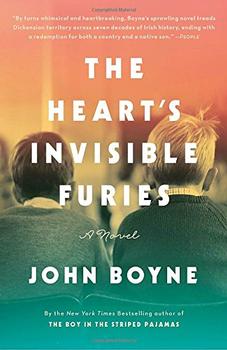Page 3 of 3
There are currently 20 member reviews
for The Heart's Invisible Furies
-
Deborah M. (Chambersburg, PA)
Not Quite What I Expected
This is the autobiography of a fictional character, Cyril Avery. Born out of wedlock in 1945 to an Irish teenager who was drummed out of the parish by her priest, Cyril is adopted by an upper class couple who constantly remind him that he is not "a real Avery." But this is not the only thing that sets him apart from the other boys: he realizes at an early ago that he is homosexual and obsessed with Julian, the son of his father's barrister. Cyril's story becomes the struggle of so many young men forced to closet their sexual identity in the 1960s, '70s, and '80s. When he leaves repressive Ireland for Amsterdam, he finds true love for the first time--but, alas, when the AIDS epidemic hits, renewed bigotry against gays disrupts his life yet again. His story manages to end end on a higher but rather contrived note with the acceptance of newly-found family.
I almost gave up on this novel about halfway through, when it seemed to lose all its humor and became a gay coming of age story, but I stuck with it. Boyne is attempting something rather epic here, letting one man's story stand in for the history of homosexuality over the last five decades and in several locations. Sometimes it works, sometimes it doesn't. He also strives to bring the characters full circle: unknowingly, Cyril keeps running across his birth mother, and the figure of Julian, his first crush, makes several reappearances. An interesting effort, if not always successful.
-
Julie G. (West Hartford, CT)
A Slice of History
In a novel covering the course of one man's lifetime, the author weaves together both history and societal prejudices using a mixture of humor and sadness. While I found many of the characters overdrawn, I enjoyed the book, and the clever way Boyne both set up and tied the storyline together.
-
Annette S. (Duluth, GA)
The Heart's Invisible Furies
This is the third book that I have read by John Boyne. (The Boy in the Striped Pajamas and Crippen) The Heart's Invisible Furies covers a wide range of episodes: violence, hatred, and intolerance as the author tells what it is like to be gay in a repressed society. It is a highly readable account that includes significant moments in history from the 1966 IRA bombing in Dublin to the recent referendum to permit same-sex marriage in Ireland. The book makes for a convincing portrayal of a diverse society with gripping scenes and it is a memorable experience following the life of the main character.
-
Nanette C. (Punta Gorda, FL)
Grabs you and doesn't let go
John Boyne throws the reader in headfirst in "The Heart's Invisible Furies." We immediately meet Catherine Goggins, a 16 year old Irish girl who's expecting a baby. She is in the process of being verbally assaulted and physically thrown out of the Catholic church by a priest while her family looks on. We are simultaneously meeting our protagonist--Cyril--who's in vitro.
From there, Boyne checks in with Cyril at seven year intervals. We watch him grow from a child being raised by very peculiar adoptive parents to a young man struggling with his sexual identity to an old man happy with who he's become. Cyril's story takes lots of twists and turns, many of which will cause readers to shake their heads and be thankful society has made some strides towards accepting people for who they are. The price of bigotry is way too high.
Weighing in at 550 pages, "The Heart's Invisible Furies" looked a bit daunting at first. But I found myself galloping through it, eager to find out what would happen next. While Boyne might have wrapped things up a bit too neatly, the story is well worth immersing yourself in.
-
Viqui G. (State College, PA)
The Heart's Invisible Furies
John Boyne has written a very readable novel with a remarkable protagonist, Cyril Avery. Cyril lives with shame/hidden conflicts related to his sexuality for his first 28 years of life and the first half of the novel. The second half of the story follows Cyril as he learns to live openly as a gay man and the joys and conflicts he encounters.Throughout his life's story, Cyril is often lonely and isolated; but he always likable to the reader, even when he makes poor decisions. I see Cyril's character as symbolic of the changing attitudes and eventual acceptance (for the most part) of homosexuality in Ireland, Europe and the US. Although I enjoyed the read, many themes were repetitive and too long. I think the novel would have been improved with tighter editing.
-
Carol T. (Ankeny, IA)
So so
This was OK. If you like John Irving, it might be down your alley.
